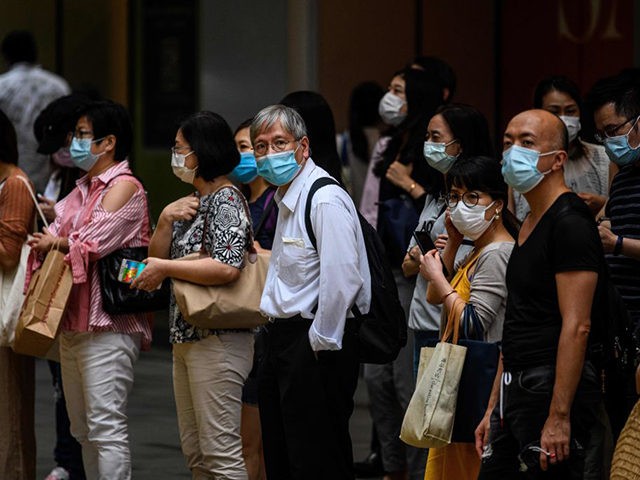Hong Kong officials described a new wave of coronavirus infections as “very worrying” on Tuesday, noting that half of the 48 new infections reported Monday come from “unknown sources.”
The government has reimposed emergency measures, including a ban on dining in restaurants after 6:00 p.m. local time, a complete shutdown of bars and fitness facilities, and a requirement for all mass transit passengers to wear facemasks.
“Half of the reported cases today we have an unknown source, so it is very worrying because the cases can spread in the community, and also we do not have a definite source — that means there are lots of unknown sources in the community that can spread easily, and they may be asymptomatic,” said Dr. Chuang Shuk-kwan of the Hong Kong Center for Health Protection (CHP), referring to what Radio Television Hong Kong (RTHK) described as 24 “mystery infections” whose source cannot be determined by infection trackers.
Chuang was alarmed by the number of elderly people who “do not have many activities except walking around and having Chinese tea in some restaurants” who have become infected, essentially suggesting that if the coronavirus can get to such cloistered people, it can get to anyone.
Less puzzling were infections reported among customer service and restaurant employees who have contact with large numbers of people, and the possible spread of infections among hospital staff and patients. Even some hospital directors said they were having difficulty establishing precisely how infections were appearing within their walls. Cases have emerged in several districts of the crowded city.
Dr. Arisina Ma, president of the Hong Kong Public Doctors’ Association, reported the same “really critical” situation to ABC News on Wednesday, describing a “third wave” of coronavirus that might be even worse than the first two.
“We find that this time more and more cases are scattered in different parts of Hong Kong and they have no identifiable source,” said Ma.
The Hong Kong government on Monday introduced some of the strictest policies imposed since January, including a requirement for masks on public transportation that has already resulted in charges against a 70-year-old man who could face fines of up to $5,000 in Hong Kong currency.
RTHK reported that “an overwhelming majority complied with the new regulations” but spotlighted a few “odd ones” who did not, included a railroad passenger who defensively said she had just finished eating and quickly donned a mask when RTHK reporters approached her.
The restrictions include a rule that restaurants cannot seat more than four people at the same table during the day and a ban against seating anyone after 6:00 p.m.
Hong Kong Disneyland closed again on Wednesday, only a few weeks after it reopened for the first time in six months. The famous Hong Kong Book Fair has been postponed, and schools that have been repeatedly opened and closed throughout the year were closed once again.
Hong Kong’s federation of restaurateurs objected to the 6:00 ban, arguing that it was arbitrary and “stupid” because the coronavirus doesn’t spread only at night and many of the city’s restaurants are not easily capable of providing only takeout food for dinner, so there could be problems with food quality and some establishments will go out of business.
Some restaurant owners are reportedly angry at the Hong Kong government for losing control of the coronavirus and blaming the results on their industry. They strongly advised allowing restaurants to remain open for evening meals with social distancing measures in place, such as the daytime limit on four customers to a table.
Hong Kong University microbiologist Yuen Kwok-yung told the South China Morning Post on Monday that a new wave of coronavirus cases was not surprising because the public believed the danger was past and grew lax about observing social distancing rules.
“The recurrence of the epidemic in Hong Kong is within expectations. As prevention and control measures around the world are loosened, the epidemic will definitely rebound,” he said.
Yuen predicted the third wave would diminish in seven to 14 days if social distancing measures are followed, joining some other local health experts in advising Hong Kong to evaluate the success of its pandemic-fighting efforts one week at a time until the rate of infections begins to decline.

COMMENTS
Please let us know if you're having issues with commenting.